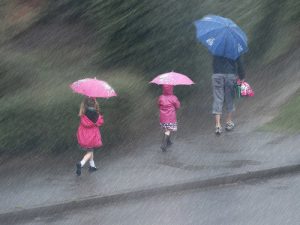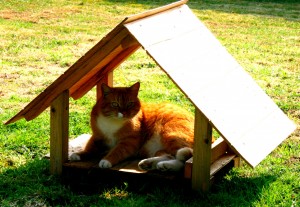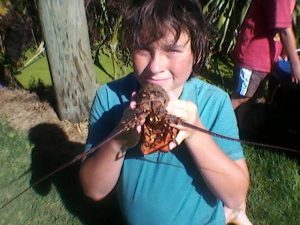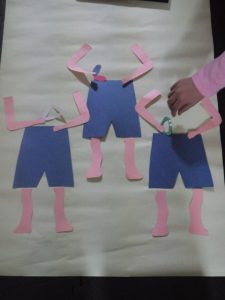
by Sophie Walker (UK) | Mar 17, 2014 | 2014, Being Thankful, Childhood, Education, Girls, Kids, Life Lesson, Motherhood, Parenting, Preschool, Sophie Walker, Special Needs, UK, Uncategorized, World Motherhood, Younger Children
 Betty and I are walking to school in the rain. It is a miserable morning – grey, cold and squally. We are tilting our umbrellas sideways to shield ourselves from the gusts of needles thrown at us as we progress along the avenue. I am forcing bright chatter and thinking of the warm cup of tea I will have when I get home.
Betty and I are walking to school in the rain. It is a miserable morning – grey, cold and squally. We are tilting our umbrellas sideways to shield ourselves from the gusts of needles thrown at us as we progress along the avenue. I am forcing bright chatter and thinking of the warm cup of tea I will have when I get home.
Betty’s umbrella is white and pink and round like a daisy. It has pretty little petals and yellow stripes, and a bumble-bee attached to the top. The bumble-bee is looking very sorry for himself this morning, buffeted hither and to. I can’t see Betty’s face but I can tell by the drag of her toes that she is feeling sorry for herself too.
I lean down and enquire: “How are you doing, darling?”
A woebegone voice answers. “Ok.”
Then she asks: “Mummy, did this umbrella used to belong to my big sister?”
I tell her yes, it did.
“And Mummy, did she used to walk to school with it too?”
Again, I aver, she did.
A pause. Then, cautiously: “Mummy, did my sister ever used to not want to go to school?”
I can see where this is going now and I give her hand a sympathetic little squeeze. I say yes, there were days when her big sister didn’t really feel like it either.
At this Betty stops and tips back the rim of her umbrella to look up at me. Her eyes are welling with tears. She asks: “And did she used to worry about making mistakes too?”
Betty started school last September at the age of four. She is now four and a half and a month into her second term. She flew through the first twelve weeks with ease – enthusiastic, inquisitive, and keen to try new things. This term, she has cried often on leaving me in the mornings. Afternoons start with jubilation at being home, then slide slowly from relaxation to upset as night approaches.
As soon as I call her for her bath it is her cue to start an hour-long conversation about whether or not she will have to go to school again in the morning.
Now I look at her, looking up at me, her face a mixture of rain and tears, and I think: She’s far too little for all this. I bend down to her and put my umbrella down and hug her. I tell her: “Everyone makes mistakes. It doesn’t matter about making mistakes. The thing is just to try your best. Have a little go.”
But as I’m saying it, I’m thinking that really, I just want to put her in my pocket and take her home. She is not yet five. She shouldn’t be afraid of new things in case she finds herself unable to do them to a standard that will make her happy.
Last term, she learned phonics – how to make the sounds of the alphabet. This term, she has realised that those phonics are letters and that by putting them together and sounding them out she can both read and write. And it terrifies her.
It is Learning with a capital ‘L’. Every day now she wonders what Learning she will have to conquer next.
The British education system is under huge scrutiny at the moment. The coalition government’s Conservative education minister Michael Gove has decided that it needs an overhaul. There is too much emphasis on coursework, so he has decreed the system should revert to a grand slam of end-of-year exams. There is not enough emphasis on rote learning, so reciting dates and times-tables are back in.
So far I have reacted to Gove’s decisions with horror mainly because of the impact they will likely have on my elder daughter, who has Asperger’s Syndrome, and will struggle even more under a system that removes the chance for her to shine via project work. Gove’s reforms are a disaster for Grace.
Now, looking at Betty, who I had expected to skip through the system, I find myself wondering how she will cope. Recently Gove said he was thinking of introducing formal assessments for four and five-year-olds when they enter school in England, in order to be able to monitor their progress.
I care that my children should progress well through the education system, and flourish in their chosen careers. But as I kissed Betty goodbye in her classroom that morning, and watched her teacher take her gently by the hand to distract her from her upset, I thought: there must be a better way to do this.
So – how do you do it, where you live? And do you think it works?
This is an original post to World Moms Blog from our writer in England, Sophie Walker.
The picture used in this post is credited to Roger McCallum. It holds a Flickr Creative Commons attribution license.

Writer, mother, runner: Sophie works for an international news agency and has written about economics, politics, trade, war, diplomacy and finance from datelines as diverse as Paris, Washington, Hong Kong, Kabul, Baghdad and Islamabad. She now lives in London with her husband, two daughters and two step-sons.
Sophie's elder daughter Grace was diagnosed with Asperger Syndrome several years ago. Grace is a bright, artistic girl who nonetheless struggles to fit into a world she often finds hard to understand. Sophie and Grace have come across great kindness but more often been shocked by how little people know and understand about autism and by how difficult it is to get Grace the help she needs.
Sophie writes about Grace’s daily challenges, and those of the grueling training regimes she sets herself to run long-distance events in order to raise awareness and funds for Britain’s National Autistic Society so that Grace and children like her can blossom. Her book "Grace Under Pressure: Going The Distance as an Asperger's Mum" was published by Little, Brown (Piatkus) in 2012. Her blog is called Grace Under Pressure.
More Posts

by Katinka | Feb 17, 2014 | 2014, Adoption, Awareness, Being Thankful, Belgium, Birth Parents, Childhood, Cultural Differences, Ethiopia, Eye on Culture, Family, Friendship, Home, Life Lesson, Motherhood, Multicultural, Parenting, Penguin and Panther, Relationships, Siblings, World Motherhood, Younger Children
 We have a cat. A lot of people have a cat. Ours is named Rino. As in rhinoceros, minus the “h” and the horn.
We have a cat. A lot of people have a cat. Ours is named Rino. As in rhinoceros, minus the “h” and the horn.
Looking back, I got him when he was still a little too small, so he definitely sees me as his cat-mom. He slept in the Big Bedroom during the first months of his life, with me stroking him upon every little yelp. When he wants to cuddle, he tucks his head in my armpit, as if he wants to get nursed. He’s the cuddliest cat I know. And the best frog catcher as well.
Rino is get-out-of-jail-free card. He radiates reassurance. Peace of mind. When I’m overwhelmed by motherhood, he can convince me to allow the children to come back downstairs after their time-out. He reminds me I prefer talking above time-outs.
When the kids are finally asleep, he crashes the couch with me. There’s nothing like the sound and feel of a purring cat to take the daily stress away. Did I mention he’s fat and orange? The perfect blanket. Matches most of my cloths too.
When our son is having a bad morning, he usually refuses to put on his cloths. He goes on strike on the couch, with his head beneath the cushions. We aren’t able to get through to him nor make eye contact. His sister will try, but she always manages to make things worse. Not her fault, and she earns her credits for trying the impossible.
And then Rino comes pawing in. Takes a few bites from his food and then goes straight for his ‘big brother’. The minute I tell my son who is coming for him, we see his face again. Eleven minutes, fifty three strokes and fourteen cuddles later, he will be dressed and heading for breakfast. The same goes for homework, violin practice and heart break: Rino will drag him through.
When our adopted daughter first met Rino, she nearly jumped to the ceiling. She only knew cats as thieves that should be chased from the orphanage’s kitchen, so she hissed and motioned to get him out, hiding behind my skirts. She didn’t develop a liking for stuffed animals either, with a brother sneaking up on her with those. He didn’t particularly like his new little sister those first months and couldn’t stop scaring her away, so we ended up hiding all the stuffed tigers and cats from them both.
Two years later, their bond has grown. They do continue teasing each other. They fight like little demons over who gets to open the curtains in the morning but an hour later in school the little one will call for her brother when she’s running from kissing boys. They always end up wanting to play with the exact same box of Legos that was untouched for weeks before, but just as frequently, they will team up against me, especially when candy is at stake. I was told that is universal proof they’ve developed a sibling bond.
The same goes for Rino. Our daughter considers him part of the family now. She demands we talk about him with first ànd last name, our family name, and she doesn’t believe it’s fair he’s not allowed to go to the zoo with us. He would love the big cats, you know. I’m glad Rino is visibly terrified inside moving vehicles so in the end our daughter’s more or less convinced he wouldn’t really like joining us.
A few weeks ago, my daughter asked how Rino came to our family. Did he come willing? Or was he taken from his mommy? After we hesitantly told her it was the latter, she immediately went to find him and whispered in his ear, “You’re just like me!” Ever since, she considers him her little brother even more.
He has become her mirror, in a way. Whenever she’s fantasizing about what she would like to tell her birth mother, he’s a major part of her story. She would like to send her birth mother pictures and drawings of Rino, but not of herself. Pictures of Rino sleeping in the bird house, of Rino coming from the woods when he hears our car approaching, of Rino sleeping with his paws in the air and head to the side, like a wrongly assembled toy. She wants to tell her all about him.
But most of all, she wants to tell her birth mother that we are such great and loving parents.
For Rino, of course.
Do you have pets that enrich your family? Do they help your children cope with life’s sharp edges? Feel free to share about their funny and serious contributions in your daily life!
This is an original post to World Moms Blog by K10K from The Penguin and The Panther.
The picture in this post is credited to the author.
If you ask her about her daytime job, Katinka will tell you all about the challenge of studying the fate of radioactive substances in the deep subsurface. Her most demanding and rewarding job however is raising four kids together with five other parents, each with their own quirks, wishes and (dis)abilities. As parenting and especially co-parenting involves a lot of letting go, she finds herself singing the theme song to Frozen over and over again, even when the kids are not even there...
More Posts

by Roxanne (USA) | Feb 14, 2014 | 2014, Childhood, Cultural Differences, Divorce, Family, Kids, Motherhood, Older Children, Parenting, Rox is Brilliant, Single Mother, Unintentionally Brilliant, USA, World Motherhood, Younger Children

In a conversation with a friend the other day, she mentioned that someone once asked her if I was seriously okay with letting my 7-year-old go to the bathroom by himself. A little while later I read Mama B’s post about how her house is a dungeon of rules, and I suddenly felt extremely guilty for not imposing more rules on my son. (more…)
Roxanne is a single mother to a 9-year-old superhero (who was born 7 weeks premature), living in the biggest little city and blogging all about her journey at Unintentionally Brilliant. She works as a Program Coordinator for the NevadaTeach program at the University of Nevada, Reno. Roxanne has a B.A. in English from Sierra Nevada College. She has about 5 novels in progress and dreams about completing one before her son goes to high school.
More Posts - Website
Follow Me:



by Karyn Wills | Feb 10, 2014 | 2014, Awareness, Being Thankful, Brothers, Childhood, Education, Family, Food, Health, Life Balance, Life Lesson, Milestones, Motherhood, Nature, New Zealand, Nutrition, Older Children, Parenting, Relationships, Traditions, Travel, Vacationing, World Motherhood
 One of my enduring memories of childhood is of trapsing over paddocks, up and down hills, in gumboots too big for my feet picking mushrooms or blackberries. Eventually getting sore heels and aching legs. Eventually filling buckets and ice-cream containers with food.
One of my enduring memories of childhood is of trapsing over paddocks, up and down hills, in gumboots too big for my feet picking mushrooms or blackberries. Eventually getting sore heels and aching legs. Eventually filling buckets and ice-cream containers with food.
Probably scrapping with my sisters. Probably moaning about having to do so. Definitely covered in blackberry juice and scratches on blackberry days. Definitely not impressed by having to pick mushrooms, which I didn’t like to eat.
This summer holiday, my boys got to harvest their own food. Not blackberries and mushrooms, though. They got to harvest seafood.
Tuatua (too-ah-too-ah) are a shellfish. The children love to collect them. We go out at almost low-tide or just after low-tide in thigh-high water. We do the Twist. Our feet sink into the wet sand and feel around for something hard. When we find one, we reach down and pick it up with our hands.
Sometimes, we are side-swiped by a wave. Sometimes, we pick up a round hard sea-biscuit instead. At times, instead of the Tuatua-Twist there is a Crab-Bite-Leap with occasional bad-language. There is almost always laughter and a competition to see who can find the most. This year, the boys and their cousins also took responsibility for collecting fresh seawater twice a day, to keep the Tuatuas in, while they spat out all the sand inside their shells. They kept them cool in the fridge and, when they were finally cooked, the children ate them: some with gusto, others not so much. To me, they taste a bit like chewy seawater…
Our eldest son, 12 year-old Joe, with his 13 year-old girl cousin, Billie, trapped their own crayfish.
Crayfish are related to rock-lobster and, in our extended family, are usually trapped off-shore and by boat, or dived for with scuba-gear and tanks. Joe and Billie had kayaked out around a small peninsula and discovered an old craypot on the rocks. They dragged it out of the sea and managed to convince their fathers to repair it. They then kayaked it out again and dropped it on a good rocky spot.
Each day they went out to check their pot, just as the adults do the other craypots. The first day they caught – seawater. The second day they caught – seawater. The third day they were a bit fed up and otherwise occupied, so didn’t go out. The fourth day or maybe it was the fifth, Billie was out fishing and Joe went out alone to see what was there and to bring the pot in for good. He was very excited to discover they had caught a legal-sized cray! Yes, duly cooked and eaten.
In these days where many children don’t know that carrots grow in the ground or that their meat comes from a real animal, I love that our boys are sometimes involved in the process of food-collection and the processes of preparing it for a meal. I know that these are the Good Old Days and these moments will create some of their childhood memories.
Do your children do similar things you did as a child? Are they involved in collecting or harvesting their own food?
This is an original post to World Moms Blog from our writer in New Zealand and mum of three boys, Karyn Van Der Zwet.
The image used in this post is credited to the author.
Karyn is a teacher, writer and solo mother to three sons. She lives in the sunny wine region of Hawke’s Bay, New Zealand in the city of Napier.
More Posts

by Kyla P'an (Portugal) | Feb 7, 2014 | 2014, Childhood, Culture, Entertainment, Eye on Culture, Family, Family Travel, Holiday, Kids, Marketing, Milestones, Motherhood, Parenting, Traditions, Travel, USA, Vacationing, World Motherhood, Younger Children
 As parents determined to raise global citizens, my husband and I were reticent to channel financial resources toward a Disney-vacation rather than taking our children abroad for enrichment. But, there is something that stirs inside both of us when it comes to celebrating the ephemeral days of childhood that made us reconsider.
As parents determined to raise global citizens, my husband and I were reticent to channel financial resources toward a Disney-vacation rather than taking our children abroad for enrichment. But, there is something that stirs inside both of us when it comes to celebrating the ephemeral days of childhood that made us reconsider.
Here in the US, a visit to Walt Disney World in Orlando, Florida or Disneyland in Anaheim, California is a childhood hallmark. In fact, I have met parents, who began planning their Disney vacation the moment they found out they were pregnant with their first child.
And even though a Disney family-vacation can cost upwards of several thousand dollars (with hotels, park tickets and flights), it doesn’t necessarily mean that parents will wait until their children are old enough to fully enjoy the experience nor, in some cases, are even old enough to remember it; tots, barely able to toddle, are a common site at Disney theme parks. (more…)
Kyla was born in suburban Philadelphia but spent most of her time growing up in New England. She took her first big, solo-trip at age 14, when she traveled to visit a friend on a small Greek island. Since then, travels have included: three months on the European rails, three years studying and working in Japan, and nine months taking the slow route back from Japan to the US when she was done. In addition to her work as Managing Editor of World Moms Network, Kyla is a freelance writer, copy editor, recovering triathlete and occasional blogger. Until recently, she and her husband resided outside of Boston, Massachusetts, where they were raising two spunky kids, two frisky cats, a snail, a fish and a snake. They now live outside of Lisbon, Portugal with two spunky teens and three frisky cats. You can read more about Kyla’s outlook on the world and parenting on her personal blogs, Growing Muses And Muses Where We Go
More Posts - Website
Follow Me:


by Melanie Oda (Japan) | Jan 30, 2014 | Childhood, Japan, Preschool, Younger Children

A Work in Progress
One of the first things I noticed when I moved to Japan, standing as I did in many a cold gym on a drafty stage being stared at by bored students, is that in Japan even small changes are deemed deserving of a ceremony of some sort. I worked as an assistant language teacher dispatched by the board of education to seven different junior high schools. On my first day at each and every one of those schools, an assembly was held to welcome me. The principal gave a little speech. I gave a little speech. The head English teacher and a student representative gave a little speech, too.
On my last day, a very similar ceremony was held. Except that this time I got flowers. Seven bouquets of flowers and me trying to leave town…. I tried at other jobs, when other coworkers were leaving, to explain that these giant bouquets, while beautiful, were actually not desirable for someone who was (more often than not) preparing to leave the country.
“The flowers,” I was told, “Are not for the person leaving. They are for the people staying behind.”
Now that I’m a mom, I’ve noticed that Japanese school children’s lives are chock-full of ceremonies. It starts with preschool, when they have an entrance ceremony. Then a closing-of-first-term ceremony, an opening-of-second-term ceremony, then closing-of-second-term ceremony. It seems endless. But for the preschooler, it culminates in graduation and the send-off to end all send-offs, the “Wakare-kai,” a kind of Sayonara Party.
Now I don’t know about where you are from, but I have no memory whatsoever of having a preschool graduation, much less an after party. My parents may have privately celebrated my ascension into free (!) public schooling after I’d gone to bed at night, but I don’t think there was much to it.
Here?
(Hold on a second while I get a cold compress for my splitting headache….)
At my daughter’s preschool, it’s a huge deal. And it’s all put on by the moms. I don’t think this experience is rare for a Japanese preschool, but to me it feels totally over the top.
It starts off in October (a full six months before The Day), with each mother being assigned to a committee. And I do mean everyone, including, for example, my friend who has three kids under six and another on the way. There are a host of different committees, the lunch committee, the keeping-children-in-line committee, the video committee, the slide show committee, the teacher’s present committee, etc. I’m on the decoration committee.
It seems like it would be simple enough. Maybe some paper chains and balloons? But no. There will be a balloon archway for the teachers to walk through. We will decorate the back wall with scenes (we have to draw) of the momentous events that have transpired in our 6-year-olds lives at preschool. (I’m in charge of drawing a poster for sports day and the yearly school play.) There will be a podium decorated with paper mâché animals, mobiles hanging from the ceilings (no clue how we are supposed to get those up there,) flowers and tinsel on the walls, etc., etc., etc.
I’ve already spent hours in meetings that I feel we’re pretty pointless, not to mention hours on actual decorations, and I’m sure there will be an hour or two on the day for decorating and cleaning up.
I’m having a hard time thinking of any of this as being more than wasted time. But I have to wonder if, like the flowers being given to the leaving teacher, the send-off party is not actually for the children at all.
What kind of ceremonies are held at schools in your country? To what extent are parents involved?
This is an original post by World Moms Blog contributor, Melanie Oda in Japan, of Hamakko Mommy.
Photo credit to the author.
If you ask Melanie Oda where she is from, she will answer "Georgia." (Unless you ask her in Japanese. Then she will say "America.") It sounds nice, and it's a one-word answer, which is what most people expect. The truth is more complex. She moved around several small towns in the south growing up. Such is life when your father is a Southern Baptist preacher of the hellfire and brimstone variety.
She came to Japan in 2000 as an assistant language teacher, and has never managed to leave. She currently resides in Yokohama, on the outskirts of Tokyo (but please don't tell anyone she described it that way! Citizens of Yokohama have a lot of pride). No one is more surprised to find her here, married to a Japanese man and with two bilingual children (aged four and seven), than herself. And possibly her mother.
You can read more about her misadventures in Asia on her blog, HamakkoMommy.
More Posts

 Betty and I are walking to school in the rain. It is a miserable morning – grey, cold and squally. We are tilting our umbrellas sideways to shield ourselves from the gusts of needles thrown at us as we progress along the avenue. I am forcing bright chatter and thinking of the warm cup of tea I will have when I get home.
Betty and I are walking to school in the rain. It is a miserable morning – grey, cold and squally. We are tilting our umbrellas sideways to shield ourselves from the gusts of needles thrown at us as we progress along the avenue. I am forcing bright chatter and thinking of the warm cup of tea I will have when I get home.















